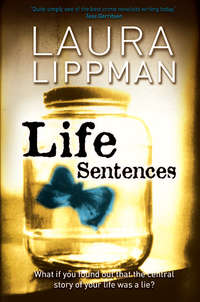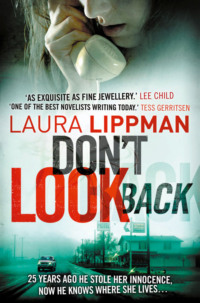
Полная версия
The Innocents

THE INNOCENTS
Laura Lippman

Copyright
This novel is entirely a work of fiction. The names, characters and incidents portrayed in it are the work of the author’s imagination. Any resemblance to actual persons, living or dead, events or localities is entirely coincidental.
AVON
A division of HarperCollinsPublishers Ltd
1 London Bridge Street,
London SE1 9GF
www.harpercollins.co.uk
First published in the USA by HarperCollinsPublishers,
New York, NY, 2011
Copyright © Laura Lippman 2012
All rights reserved under International and Pan-American Copyright Conventions. By payment of the required fees, you have been granted the non-exclusive, non-transferable right to access and read the text of this ebook on-screen. No part of this text may be reproduced, transmitted, downloaded, decompiled, reverse engineered, or stored in or introduced into any information storage and retrieval system, in any form or by any means, whether electronic or mechanical, now known or hereinafter invented, without the express written permission of HarperCollins.
Laura Lippman asserts the moral right to be identified as the author of this work
A catalogue record for this book is available from the British Library
HarperCollinsPublishers has made every reasonable effort to ensure that any picture content and written content in this ebook has been included or removed in accordance with the contractual and technological constraints in operation at the time of publication
Source ISBN: 9781847561954
Ebook Edition © July 2012 ISBN: 9780007453290
Version 2018-07-23
For Georgia Rae Simon
Alas for maiden, alas for Judge,
For rich repiner and household drudge!
God pity them both! and pity us all,
Who vainly the dreams of youth recall.
—JOHN GREENLEAF WHITTIER, “MAUD MULLER”
Table of Contents
Title Page
Copyright
Dedication
Epigraph
GO-GO
US
Chapter One
Chapter Two: Summer 1976
Chapter Three
Chapter Four: Autumn 1977–Spring 1978
Chapter Five
Chapter Six: Summer 1978
Chapter Seven
Chapter Eight: Summer 1978
Chapter Nine
Chapter Ten: Autumn 1978–Winter 1979
Chapter Eleven
Chapter Twelve: Summer 1979
Chapter Thirteen
Chapter Fourteen: September 5, 1979
Them
Chapter Fifteen: Autumn 1979
Chapter Sixteen: Winter 1980
Chapter Seventeen
Chapter Eighteen: Spring 1980
Chapter Nineteen
Chapter Twenty
Chapter Twenty-One: Summer 1980
Chapter Twenty-Two: Autumn 1980
Chapter Twenty-Three
Chapter Twenty-Four: Winter 1980
Pity Them
Chapter Twenty-Five
Chapter Twenty-Six
Chapter Twenty-Seven
Chapter Twenty-Eight
Chapter Twenty-Nine
Chapter Thirty
Chapter Thirty-One
Chapter Thirty-Two
Chapter Thirty-Three
Chapter Thirty-Four
Pity us All
Chapter Thirty-Five
Chapter Thirty-Six
Chapter Thirty-Seven
Chapter Thirty-Eight
Chapter Thirty-Nine
Chapter Forty
Chapter Forty-One
Chapter Forty-Two
Acknowledgments
About the Author
About the Book
By the Same Author
About the Publisher
GO-GO
They throw him out when he falls off the barstool. Although it wasn’t a fall, exactly, he only stumbled a bit coming back from the bathroom and lurched against the bar, yet they said he had to leave because he was drunk. He finds that hilarious. He’s too drunk to be in a bar. He makes a joke about a fall from grace. At least, he thinks he does. Maybe the joke was one of those things that stays in his head, for his personal amusement. For a long time, for fucking forever, Gordon’s mind has been split by a thick, dark line, a line that divides and defines his life as well. What stays in, what is allowed out. But when he drinks, the line gets a little fuzzy.
Which might be why he drinks. Drank. Drinks. No, drank. He’s done. Again. One night, one slip. He didn’t even enjoy it that much.
“You driving?” the bartender asks, piloting him to the door, his arm firm yet kind around Gordon’s waist.
“No, I live nearby,” he says. One lie, one truth. He does live in the area, but not so near that he hasn’t driven here in his father’s old Buick, good old Shitty Shitty Bang Bang they called it. Well, not this Buick, but the Buick before, or the Buick before that. The old man always drove Buicks, and they were always, always, crap cars, but he kept buying them. That was Timothy Halloran Sr., loyal to the end, even to the crap of the crap of the crap.
Gordon stumbles and the bartender keeps him steady. He realizes he doesn’t want the bartender to let go of him. The contact feels good. Shit, did he say that out loud? He’s not a faggot. “I’m not a faggot,” he says. It’s just been so long since his wife slipped her hand into the crook of his elbow, so long since his daughters put their sticky little hands around his neck and whispered their sticky little words into his ears, the list of the things they wanted that Mommy wouldn’t let them have, but maybe Daddy would see it differently? The bartender’s embrace ends abruptly, now that Gordon is out the door. “I love you, man!” he says, for a joke. Only maybe he didn’t. Or maybe it isn’t funny. At any rate, no one’s laughing and Gordon “Go-Go” Halloran always leaves ’em laughing.
He sits on the curb. He really did intend to go to a meeting tonight. It all came down to one turn. If he had gone left—but instead he went straight. Ha! He literally went straight and look where that had gotten him.
It isn’t his fault. He wants to be sober. He strung together two years this time, chastened by the incident at his younger daughter’s first birthday party. And he managed to stay sober even after Lori kicked him out last month. But the fact is, he has been faking it for months, stalling out where he always stalls out on the twelve steps, undermined by all that poking, poking, poking, that insistence on truth, on coming clean. Making amends. Sobriety—real sobriety, as opposed to the collection of sober days Gordon sometimes manages to put together—wants too much from him. Sobriety is trying to breach the line in his head. But Gordon needs that division. Take it away and he’ll fall apart, sausage with no casing, crumbling into the frying pan.
Sausage. He’d like some sausage. Is there still an IHOP up on Route 40?
Saturday morning. Sausage and pancakes, his mother never sitting down as she kept flipping and frying, frying and flipping, loving how they all ate, Gordon and his brothers and his father, stoking them like machines. Come Saturday morning, I’m going away. Hey, hey, hey, it’s Fat Albert!
When he moved back home six weeks ago, he asked his mother to make him some pancakes and she’d said, “Bisquick’s in the cabinet.” She thought he was drinking or whoring again, assumed that was why Lori had thrown him out. It was easier to let her think that. Then it turned out it was easier to be that, to surrender to drink and bad habits.
When it comes down to it, drunk and sober are just two sides of the same coin, and no matter how you flip it, you are still your fucked-up own self. It sure didn’t help that his current AA group meets in his old parish school, now a Korean church. It’s too weird, sitting on the metal chairs in an old classroom. Drink and the line gets fuzzy. Get sober and the line comes back into sharp relief, but then everyone starts attacking the line, says he has to let it go, break it down. Take down the line, Mr. Gorbachev. Boy, he’s all over the place tonight, tripping down memory lane in every sense of the word. Funny, he has a nice memory associated with Reagan, but it feels like he was really young at the time. How old was he when Reagan made that Berlin Wall speech? Sixteen? Seventeen? Still in high school and already a fuck-up.
But to hear everyone tell it, he has always been a fuck-up, came into the world a fuck-up, is going to leave as a fuck-up. Then again, whoever followed Sean was destined to be a disappointment. Sean-the-Perfect. You would think that with three kids in the family, the two imperfect brothers would find a bond, gang up on that prissy middle fuck. But Tim has always taken Sean’s side. Everyone gangs up against Go-Go, the nickname Gordon can’t quite shake even at age forty. Go, Go-Go. Go, Go-Go. Go, Go-Go. That’s what the others had chanted when he did his dance, a wild, spastic thing, steel guitar twanging. Go, Go-Go. Go, Go-Go. Go, Go-Go. GoGoGoGoGoGo.
Give Sean this: He’s the one person who consistently uses Go-Go’s full name. Gordon, not even Gordy. Maybe that’s because he needs two full syllables to cram all the disappointment in. Actually, he needs four. “Jesus, Gordon, how many times can you move back home?” Or: “Jesus, Gordon, Lori is the best thing that ever happened to you and you’ve got kids now.” Jesus, Gordon. Jesus, Gordon. Maybe he should have been Gee-Go instead of Go-Go.
He thinks about standing up but doesn’t, although he could if he wanted to. He isn’t that drunk. The beer and the shot hit him fast, after almost two years of sobriety. He was doing so good. He thought he had figured out a way to be in AA while respecting the line. They don’t need to know everything, he reasoned. No one needs to know everything. There would be a way to tell the story that would allow him to make it through all twelve steps, finally, without breaching any loyalties, without breaking that long-ago promise, without hurting anyone.
He gets up, walks down the once-familiar avenue. As kids, they had been forbidden to ride their bikes on the busy street that essentially bounded their neighborhood, which should have made it impossible to find their way to this little business district, tempting to them because of its pizza parlor and the bakery and the High’s Dairy Store. And there was a craft store with an unlikely name, a place owned by the family whose daughters had disappeared. He was little then, not even five, but he remembered a chill had gone through the neighborhood for a while, that all the parents had become strict and supervigilant.
Then they stopped. It was too hard, he guesses, being in their kids’ shit all the time and the children slipped back into their free, unfettered ways. Nowadays … he doesn’t even have the energy to finish the cliché in his head. He thinks of Lori, standing guard at the kitchen window of their “starter” home, a town house that cost $350,000 and to which he is now barred entry. Is that fair? Is anything fair? Sean is still perfect and even Tim does a good imitation of goodness, Mr. State’s Attorney, with his three beautiful daughters and his plumpish wife, who was never that hot to begin with, yet Gordon can tell they still genuinely like each other. He’s not sure he ever really liked Lori and he has a hunch Sean’s in the same boat with his wife, Vivian, who’s as frostily perfect as Sean. Tim and Sean, still married to their first wives, such good boys, forever and ever. Hey, he got an annulment, he’s technically in the clear. Besides, fuck the church! Where was the church when he needed it? And now it’s Korean Catholic, whatever the fuck that is, probably Kool-Aid and dog on a cracker for communion.
Where was he? Where is he? On Gwynn Oak Avenue, thinking about how Sean, of all people, had figured out that if they rolled their bikes across the bridge to Purnell Drive, they could technically obey the rule never to ride their bikes on Forest Park Avenue and still manage to get over to Woodlawn, where the shops are. Or was it Mickey who had figured it out? Mickey was the one who lived above Purnell Drive, after all. She would have known the route, too. Even when they were kids, Mickey had been smart that way. She should have become the lawyer, not Tim. She was the real brains.
He walks for ten, twenty, thirty minutes, willing his head to clear. He walks down to the stream, where there once were swans and ducks, then to the public park, the site of an amusement park that closed before Go-Go was old enough to go there. It survived integration, his father always said, but it couldn’t beat back Hurricane Agnes. Still, one roller coaster remained standing for years, long enough for Go-Go to feel thwarted, denied. Sean and Tim claimed to have gone many, many times, but they weren’t that much older. Sean would have been seven or eight when the park closed. Maybe they had lied? It makes Gordon feel better, catching perfect Sean in a potential lie.
Soon enough, the hypothetical becomes real to him, and he has worked up a nice fury. He gets out his cell phone and punches his brother’s name on his contact list, ready to fight with him. But his hands aren’t steady and he fumbles the phone as Sean’s voice comes on, cool and reserved. The phone ends up on the ground, where the black turtle shape is hard to find in the dark. As Go-Go crawls around on his hands and knees, he hears Sean’s voice, disgust evident. “Gordon? Gordon? Jesus, Gordon—”
I shoulda been Gee-Go. Does he say that out loud? His hand closes over the cell phone, but Sean has hung up. Okay, it isn’t exactly the first time he has drunk-dialed his brother. But he’s had a good run of sobriety, so Sean shouldn’t have been all pissy and judgmental. Sean has no way of knowing he took a drink. No, Sean expects him to fail. That’s unfair. And what kind of brother is that, anyway, expecting—rooting—for his younger sibling to fail? But that’s Sean’s dirty little secret. His perfection is relative, dependent upon the fuck-ups of Go-Go and Tim, and Tim isn’t giving him much breathing room these days. In another family, Sean wouldn’t even be all that. In another family, Sean might be the problem child, the loser. Especially if he had been treated like a loser from jump, the way Gordon was. They set him up. Of course he did whatever he was asked. He was just a little boy. Any little boy would have done what he did. Right?
His head clearer, he walks to the convenience store, buys a cup of scorched coffee, and drinks it in his car, his father’s old Buick, the last iteration of Shitty Shitty Bang Bang, which has survived his father by almost fifteen years now. He is less than two miles from his mother’s house. He has to make exactly four turns—two lefts, two rights. There are—he counts—one, two, three lights? The first one is there, right in front of him, complicated because there are actually five points at this intersection—five points, like a star. He sees Mickey making the drawing in the dirt, the stick slashing down and up, across and down, then up.
He makes it through, heads up the long steep hill. I think I can I think I can I think I can. Past the cemetery, through the second light. Almost home. Almost home. Only it isn’t his home.
At the next light, he turns right instead of left. Go, Go-Go, Go, Go-Go. Go, Go-Go. Climbs the freeway entrance ramp just before the Strawberry Hill apartments. Mickey’s family had moved here right before high school and Mickey’s mother was hot. Sean and Tim swore they saw her sunbathing topless once, but they probably lied about that, too. Roller coasters, topless girls—they lied about everything.
Gordon heads west on the highway, then makes a U-turn before the Beltway cloverleaf, aiming his car back home along the infamous highway that ends, stops dead. As teenagers, they treated this two-mile stretch as their own little drag strip, but now the secret is out and others race here. He wonders how fast his father’s old Buick can go. Ninety, one hundred? Go, Go-Go. Go, Go-Go. Go-Go. The steel guitar twangs in his ears, in his memory, sharp and awful. Guy could not play for shit, much as he loved that damn stupid guitar. Go, Go-Go. Go, Go-Go. Go, Go-Go. He is dancing, wild and free, his little arms moving so quickly it’s almost like he’s lashing himself, self-flagellation, and everyone loves him and everyone is laughing and everyone loves him and everyone is laughing and he is splashing through the stream, heedless of the poisonous water, no matter what Gwen’s father says about tetanus and lockjaw, desperate to get away, to escape what he’s done. Go, Go-Go. Go, Go-Go.
By the time he hits the Jersey wall, even the needle on the old Buick’s speedometer has abandoned him.
CHAPTER ONE
Clement Robison’s house is wildly impractical for almost anyone, but especially so for an eighty-eight-year-old man living alone, even if he happens to be the one who designed it. Forty years ago, when Clem began the drawings for his dream house, he could not imagine being eighty-eight. Who can? Eighty-eight is hard to imagine even at eighty-seven. His youngest daughter, now forty-five, summoned home—or so she’s telling everyone—by her father’s accident, doesn’t really believe she’ll ever be as old as he is. Oh, she expects, hopes, to enjoy the genetic advantage of his longevity. But the number itself, eighty-eight, is like some monstrous old coat discovered in the hall closet, scratchy and smelling of mothballs. Who left this here? Is this yours? Not mine! I’ve never seen it before.
The Robison house was modern once and people still describe it that way, although its appliances and fixtures are frozen like the clocks in a fairy tale, set circa 1985, the last remodel. A mix of milled stone, lumber and glass, it nestles into the side of the hill on a stone base, a door leading into the aboveground basement, but the family custom was to use that door only in the most inclement weather, and Clem is not one to break long-standing habits. He has continued to mount the long stone staircase, which creates the illusion that one is climbing a natural path up the hillside. The steps are charming, but there is something off about them. Too low or too high, they fool the foot, and over the years almost everyone in the family has taken a tumble or near-tumble down. Gwen’s turn came when she was thirteen, rushing outside and neglecting to consider that the sheen on the steps might be ice, not mere moisture. She traveled the entire flight on her butt, boom, boom, boom, her friends laughing at the bottom. At thirteen, the end result was a bruised coccyx and ego, nothing more.
Her father, coming outside to get the paper on a cool but dry March morning, missed a step, tumbled almost to the street and broke his left hip.
“Do you know how many people die within a year of breaking a hip?” Gwen asks her father, still in University Hospital.
“Gwen, I taught geriatric medicine for years. I think I’m up on the facts. Most people don’t die.”
“But a lot do. Almost a third.”
“Still, most don’t. And I’m in good health otherwise. I just have to be disciplined about recovery and therapy.”
“Miller and Fee want you to sell the house, move into assisted living.”
“That again. And you?”
“I’m holding them off. For now. I told them I would assess your situation.”
They smile at each other, coconspirators. Gwen believes herself to be her father’s favorite, although he would never say such a thing. His denials are sincere when her much older siblings, Miller and Fiona, bring up the contentious matter. “I was just more available when Gwen was little,” their father says. “Less career obsessed.” “Daddy doesn’t have favorites,” Gwen says. But she knows the seven-year gap between Fiona and Gwen is not enough to explain their father’s clear preference for her. There is her remarkable resemblance to their mother, dead for almost twenty-five years. And there is the bond of the house and the neighborhood, Dickeyville, which Gwen and her father love more fiercely than anyone else in the family. As a child, she used to take long walks with him in the hills behind the house, never letting on that she traveled farther and deeper into them when she was with her friends. Miller and Fee, living thousands of miles away, have been trying to get their father out of the house for years, decades, ever since their mother’s death. Gwen, who remains in Baltimore, has done whatever she can to allow her father to stay in the family home. Should the day come that he really can’t live there, it has always been their unspoken understanding that Gwen will take over the house for her own family.
“How are things at home?” her father asks.
It’s an open question, applicable to the physical status of her house and a much larger, if vaguer problem. Gwen chooses to address the physical.
“Not great. The county came out and pushed the ruins of the retaining wall back on our property, but says it’s our job to rebuild it. And even when we do, it won’t necessarily address our foundation issues. The ground could shift again.”
“Why—never mind.”
“Why did we buy out there when our inspector warned us of this very problem? I ask myself that every day. For me, I think it was because Relay reminded me of Dickeyville. Isolated, yet not. A little slice of country so close to the city, the idiosyncratic houses. And for Karl, it was all about convenience—the commuter train station within walking distance, BWI and Amtrak ten minutes away. Go figure—for once, my dreamy nostalgia and his pragmatism aligned and the result is utter disaster. There’s probably a lesson to be learned there.”
“The lesson,” her father says, “is that you have a five-year-old daughter.”
“Don’t worry,” Gwen says, pretending not to understand. “We’ve figured out how to make it work once you come home. I’m going to get up at six a.m. and drive over there, do the breakfast and getting-her-off-to-school thing. And I’ll reverse it at day’s end, be there for dinner and bedtime. But I’m going to spend the nights at your house, so we don’t have to have a nighttime aide.”
“Gwen, I can easily afford—”
“It’s not about affording. And it’s just for a few weeks. Anyone can tolerate anything for a few weeks.” Months, years, her mind amends. It is amazing what one can tolerate, what she has tolerated. “Also, it’s not the worst thing in the world, making Karl curtail his travel, to learn that he’s part of a household, not a guest star who jets in and out as it suits him.”
“He is who he is, Gwen. You went into this with eyes wide open. I told you all about cardiac surgeons. And Karl was already a star. It’s not like this sneaked up on you. Not like the chicken.”
“What?”
“The chicken. That’s why I fell. There was a chicken on the steps, trying to peck at my ankles, and all I wanted to do was avoid stepping on it. I twisted my ankle and went over.”
Gwen tries not to show how alarming she finds this. A chicken? There haven’t been chickens in their neighborhood, ever. Except for—but those birds were far away and far in the past. No, that couldn’t be. Her father must have imagined the chicken. But if her father was imagining chickens, what else was breaking down inside his mind? She would almost prefer there was a chicken. Maybe there was. The past few years have seen a flurry of stories about animals showing up in places where they shouldn’t be—wildcats in suburbs, a deer crashing through the window of a dental practice, and, come to think of it, a chicken in one of the New York boroughs. And Dickeyville is the kind of place that has always attracted crunchy granola types. It is easy to imagine some earnest, incompetent locavore trying to raise chickens only to have them escape from his ineptly constructed coop. Gwen will ask around when she goes by the house this afternoon, to begin preparing for her father’s return.






